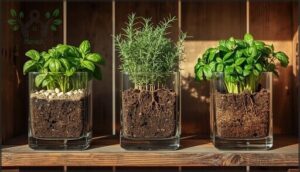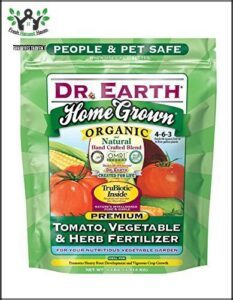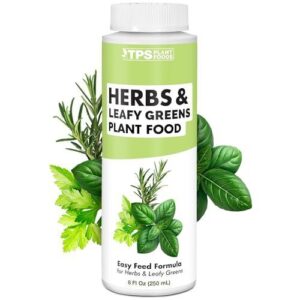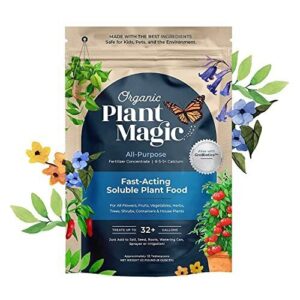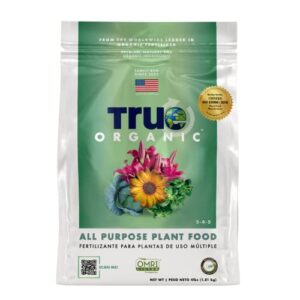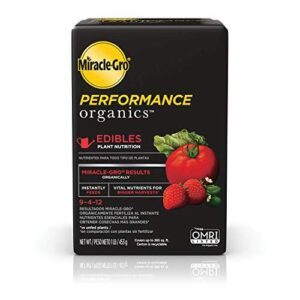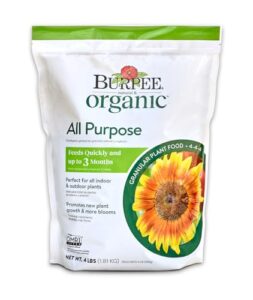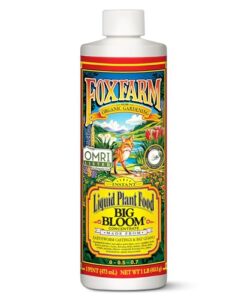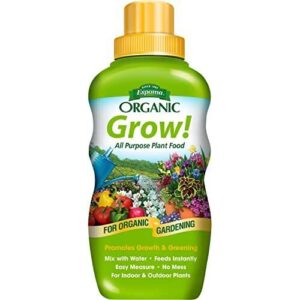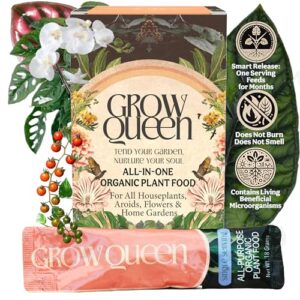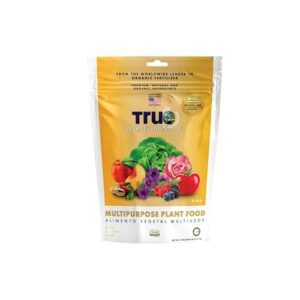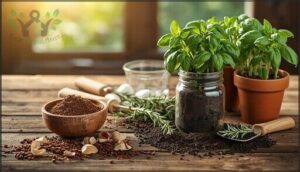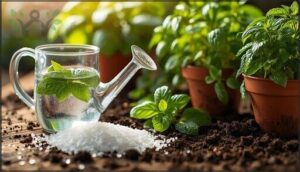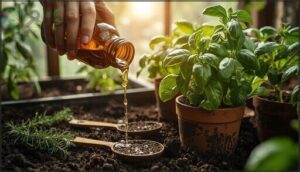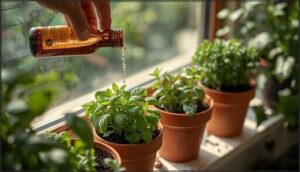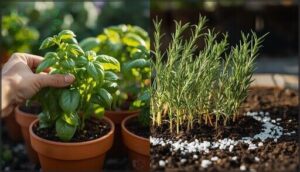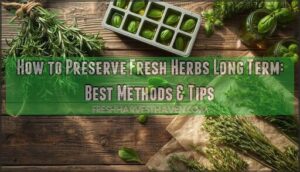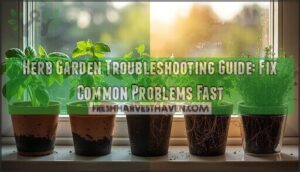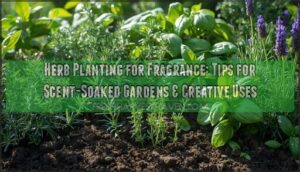This site is supported by our readers. We may earn a commission, at no cost to you, if you purchase through links.
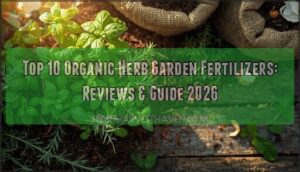
Your basil bolted before you picked a single leaf. Your rosemary turned pale despite weekly watering. Your mint, ironically, showed zero enthusiasm for spreading.
The culprit? Nutrient-starved soil that couldn’t support what should be foolproof plants. Most gardeners assume herbs thrive on neglect, but these resilient growers still need balanced nutrition—they just can’t tolerate the synthetic blasts that work for tomatoes or roses.
Organic herb garden fertilizer delivers the slow, steady feeding that matches how Mediterranean natives and culinary staples actually grow in their native habitats. The right blend strengthens flavor compounds, prevents the leggy weakness that plagues indoor pots, and builds soil structure that keeps your harvest productive season after season.
Table Of Contents
- Key Takeaways
- What Makes a Good Organic Herb Fertilizer
- Organic Fertilizer Needs for Different Herbs
- Benefits of Using Organic Fertilizers for Herbs
- Top 10 Organic Herb Garden Fertilizers Reviewed
- 1. Dr Earth Organic Fertilizer
- 2. Herb Plant Liquid Fertilizer
- 3. Organic Plant Magic All-Purpose Plant Fertilizer
- 4. True Organic Plant Food Fertilizer
- 5. Miracle Gro Organic Plant Food
- 6. Burpee Organic Plant Food Granules
- 7. FoxFarm Big Bloom Liquid Plant Food
- 8. Espoma Organic Plant Food Concentrate
- 9. Grow Queen Organic Plant Food
- 10. True Organic Plant Food
- Homemade Organic Fertilizer Options for Herbs
- Application Techniques for Organic Herb Fertilizers
- Fertilizing Herbs in Containers and Indoors
- Avoiding Overfertilization and Common Mistakes
- Frequently Asked Questions (FAQs)
- What is the best organic fertilizer for herbs?
- How to make natural fertilizer for herbs?
- Are coffee grounds good for herbs?
- Do I need to fertilize my herb garden?
- What is the best natural fertilizer for herbs?
- Can I fertilize herbs during drought conditions?
- How often should I rotate herb fertilizers?
- Which herbs need calcium supplementation for growth?
- Should I fertilize herbs before or after pruning?
- Can over-mature compost harm delicate herb seedlings?
- Conclusion
Key Takeaways
- Organic fertilizers build long-term soil health through microbial activity and slow nutrient release, preventing the burn and leaching common with synthetic options while strengthening flavor compounds in culinary herbs.
- Different herbs require tailored feeding strategies—fast-growing leafy varieties like basil need monthly nitrogen-rich applications, while slow-growing Mediterranean herbs like rosemary thrive on minimal spring feeding and potassium-focused blends.
- Container herbs face accelerated nutrient depletion from frequent watering, demanding diluted liquid feeds every 1-2 weeks during active growth and careful attention to drainage to prevent washout and salt buildup.
- Overfertilization reveals itself through brown leaf tips, crusty soil deposits, and dark brittle foliage—signs you should immediately reduce application rates and rely on soil testing every 4-6 weeks rather than guesswork.
What Makes a Good Organic Herb Fertilizer
You can’t just grab any organic fertilizer and expect your herbs to thrive—what works for roses won’t necessarily work for basil or rosemary.
Each herb has different nutrient needs, so choosing the right organic fertilizer for container herbs makes all the difference in flavor and growth.
A good organic herb fertilizer delivers the right balance of nutrients without overwhelming delicate root systems or disrupting the essential oils that give herbs their flavor.
Let’s break down what you need to look for when choosing a fertilizer that actually promotes healthy growth.
Key Nutrients for Healthy Herbs
Your herbs thrive when you supply nitrogen for lush leaves, phosphorus for strong roots, and potassium for disease resistance and essential oils.
Calcium strengthens cell walls, preventing yellowing in container herbs, while magnesium powers chlorophyll production. Iron, manganese, zinc, copper, and boron work behind the scenes, supporting enzymes and preventing stunted growth.
Maintain soil pH between 6.0 and 7.0 to make these nutrients available effectively. For additional details on how herbs are a rich source of essential vitamins and minerals, see this overview of their nutritional value in herbs.
Importance of NPK Ratios
NPK balance shapes how your herbs grow, resist stress, and develop flavor. Nitrogen drives leaf expansion in basil and cilantro, phosphorus anchors strong roots during establishment, and potassium regulates water while boosting essential oils.
Organic fertilizers release these macronutrients slowly through nutrient cycling, matching plant uptake without harsh flushes. Adjusting ratios by growth stage—higher nitrogen early, more potassium at flowering—optimizes soil fertility and harvest quality.
For a deeper understanding of how nutrients impact your herb garden, see this overview of N-P-K ratios in fertilizers.
Role of Micronutrients in Herb Growth
Beyond macronutrients, iron supplements and trace elements drive enzyme function and chlorophyll production in your herbs. Zinc deficiency stunts basil, manganese role in photosynthesis keeps oregano vibrant, and boron effects regulate cell walls. Micronutrient deficiency appears as pale leaves or poor upright growth, especially when fertilizing herbs in containers where organic fertilizer alone may not supply enough.
- Iron corrects interveinal chlorosis and improves leaf greenness in mint and basil
- Zinc promotes auxin production, shaping healthy leaf growth and preventing mottled foliage
- Boron regulates sugar transport and strengthens root development in young transplants
Organic Fertilizer Needs for Different Herbs
Not all herbs feed the same way, and treating them like they do is a recipe for wasted fertilizer or weak plants.
Your fertilizer strategy needs to account for how fast each herb grows, what kind of leaves it produces, and the texture of the soil it’s rooted in. Here’s how to match your organic feeding approach to the specific demands of your herbs.
Fertilizing Slow-Growing Vs. Fast-Growing Herbs
Your fast-growing basil won’t thrive on the same fertilization schedule as slow-growing rosemary. Fast growers need monthly feedings with organic fertilizer high in nitrogen to support rapid leaf production.
While slow-growing herbs require just one spring compost top dress and a light mid-season application. Soil nutrient levels and growth patterns determine timing—overfertilizing slow growers reduces flavor intensity and aroma.
Leaf Type and Fertilizer Requirements
Foliage density and leaf texture dictate how you fertilize herbs. Wide glossy leaves—like basil—demand higher nitrogen to fuel lush growth, while needle-like rosemary thrives on potassium-rich blends.
Thick waxy leaves resist burn at lower rates, but thin delicate foliage needs dilute, frequent feeding. Leaf margin shape and foliar analysis reveal micronutrient gaps, so tailor your nutrient requirements to each herb’s unique structure.
Soil Texture and Nutrient Uptake
Soil porosity shapes how quickly nutrients reach your herbs. Sandy textures leak nitrogen after every watering, demanding frequent top-ups, while clay-rich beds lock cations like potassium near roots through higher cation exchange capacity.
Water retention in loamy soil keeps dissolved nutrients at root depth longer, so you’ll fertilize less often. Run soil testing to match your fertilizer schedule to actual soil quality and texture.
Benefits of Using Organic Fertilizers for Herbs
Organic fertilizers do more than feed your herbs—they transform your soil into a living ecosystem that sustains plant health season after season.
Unlike synthetic options, these natural amendments work with biology rather than against it, building long-term fertility while keeping your garden safe for pollinators, pets, and people.
Here’s how organic fertilizers create stronger, more resilient herbs from the ground up.
Soil Health and Microbial Activity
Organic fertiliser transforms your herb bed into a living ecosystem where microbes drive nutrient cycling and build soil resilience. When you feed your soil rather than just your plants, you cultivate microbe balance that strengthens soil structure and unlocks minerals herbs can’t access alone.
Organic fertilizers feed the soil itself, building a living ecosystem where microbes unlock nutrients and strengthen structure beyond what plants alone can access
Here’s what microbial growth delivers for soil health:
- Stable aggregates improve water infiltration and reduce erosion
- Enzymes mineralize bound nutrients into plant-available forms
- Mycorrhizal fungi extend root networks for better uptake
- Beneficial bacteria suppress disease and improve soil quality
- Increased organic matter fuels ongoing microbial activity
Slow-Release Nutrient Advantages
Slow-release fertilizer gives you a steady nutrient supply over 6 to 12 weeks, matching your herbs’ natural uptake without sudden spikes. You’ll dodge burn prevention issues because nutrients reach the root zone gradually—critical when fertilizing hydroponic herbs or containers.
Minimized leaching keeps nutrients where they belong, especially in sandy mixes, so you meet fertilizer needs without waste while the organic vs synthetic fertilizers debate fades beside these practical advantages.
Environmental and Safety Considerations
You’ll protect waterways when you store fertilizers properly—keeping containers sealed prevents water pollution and soil erosion during rain events.
Human exposure drops when you wear gloves and follow label rates, preventing overfertilization that triggers nutrient runoff.
The organic vs synthetic fertilizers gap narrows on waste management: compost packaging responsibly, apply at recommended doses, and you’re practicing ecofriendly gardening solutions that safeguard both your family and local ecosystems through sustainable gardening practices.
Top 10 Organic Herb Garden Fertilizers Reviewed
You’ve narrowed your search to organic options, but not all fertilizers deliver the same results for herbs.
The products below have been evaluated based on nutrient composition, release rates, and compatibility with common herb varieties. Each review includes NPK ratios, application methods, and performance observations to help you select the right fertilizer for your growing conditions.
1. Dr Earth Organic Fertilizer
Dr. Earth Organic Fertilizer delivers balanced NPK through forest humus, kelp meal, worm castings, and fish meal without synthetic chemicals. You’ll find TruBiotic microbes and mycorrhizal fungi working beneath the surface, breaking down organic matter and expanding your herbs’ root zones for better nutrient uptake.
The slow-release granules feed for several months, reducing burn risk while supporting steady growth in basil, rosemary, and other culinary herbs. Apply it to beds or containers in early spring, then reapply after harvest cycles to maintain soil vitality throughout the season.
| Best For | Organic gardeners growing tomatoes, vegetables, and herbs who want a slow-release fertilizer that builds soil health without synthetic chemicals. |
|---|---|
| Form | Powder |
| Organic Certification | Yes |
| Indoor/Outdoor Use | Both |
| Weight | 4 Pounds |
| Target Plants | Vegetables & Herbs |
| Application Method | Soil Application |
| Additional Features |
|
- Contains beneficial microbes and mycorrhizae that improve nutrient absorption and drought tolerance
- Feeds plants for several months with reduced risk of burning compared to synthetic options
- Works well in multiple settings including garden beds, raised beds, and containers both indoors and outdoors
- Can attract dogs who may dig up or eat the fertilizer
- Over-application may lead to excessive foliage growth at the expense of fruit production
- May not perform equally well across all soil types or plant varieties
2. Herb Plant Liquid Fertilizer
TPS Nutrients Herb Plant Liquid Fertilizer delivers dissolved nutrition straight to your basil, oregano, and sage through regular watering. The balanced formula promotes lush leaf production without excessive green growth, while micronutrients maintain vibrant color and strong stems.
You can mix it into your watering routine at the labeled dilution—usually every two to four weeks depending on pot size—to prevent salt buildup in containers. Foliar sprays provide quick uptake when your herbs need a mid-season boost, though you should rinse leaves afterward to avoid residue.
| Best For | Home gardeners growing basil, parsley, oregano, sage, and other potted herbs indoors or outdoors who want organic nutrition that supports flavorful leaves without overfeeding. |
|---|---|
| Form | Liquid |
| Organic Certification | Yes |
| Indoor/Outdoor Use | Both |
| Weight | 8 Ounces |
| Target Plants | Herbs |
| Application Method | Liquid Feed |
| Additional Features |
|
- Balanced liquid formula prevents nutrient lockout and salt buildup in containers when used at proper dilution
- Works as both a soil drench and foliar spray for flexible application depending on plant needs
- Gentle organic ingredients support consistent growth without burning delicate herb roots
- Results may vary for indoor herbs during winter when natural light is limited
- Requires careful dosing and regular application every 2-4 weeks to maintain effectiveness
- Won’t revive severely damaged or diseased plants that need more intensive intervention
3. Organic Plant Magic All-Purpose Plant Fertilizer
Organic Plant Magic All-Purpose Plant Fertilizer brings beneficial microorganisms, trace minerals, and amino acids into your herb beds with each half-pound serving. You’ll mix the water-soluble powder at the recommended dilution and apply it at transplant, during seedling stages, or when your basil and cilantro need a mid-season lift.
The formula enhances root zone microbial activity and nutrient cycling, though the strong odor requires outdoor mixing and the higher price—$29.97—may stretch your budget compared to conventional options.
| Best For | Organic gardeners who want to build healthy soil with beneficial microbes and don’t mind paying a premium for a comprehensive fertilizer that works on herbs, vegetables, and ornamentals. |
|---|---|
| Form | Powder |
| Organic Certification | Yes |
| Indoor/Outdoor Use | Both |
| Weight | 0.5 Pounds |
| Target Plants | All Plants |
| Application Method | Water-Soluble |
| Additional Features |
|
- Packed with 55 trace minerals, amino acids, humic acids, and beneficial microbes that boost soil health and plant nutrition
- Water-soluble powder works fast and suits everything from seedlings to mature plants, indoors or out
- Supports vigorous growth, better flavor, and more colorful blooms across a wide range of plants
- Strong smell when you’re mixing it up, so you’ll want to do that outside
- Costs $29.97 for half a pound, which is steep compared to standard fertilizers
- Can stain concrete if spilled and lacks clear instructions for container gardening
4. True Organic Plant Food Fertilizer
True Organic Plant Food Fertilizer delivers a balanced 5-4-5 NPK ratio through poultry and seabird manures, giving your culinary herbs steady nitrogen for leafy growth, phosphorus for strong roots, and potassium for disease resistance.
You’ll find both granular and liquid formats to suit container or bed setups, with added calcium and sulfur supporting soil structure and microbial health. The OMRI-listed formula remains safe around children and pets, though monthly applications during active growth keep nutrient levels consistent without leaching or burn.
| Best For | Gardeners who want an all-purpose organic fertilizer that works on vegetables, herbs, and flowers without harsh chemicals around kids or pets. |
|---|---|
| Form | Granules |
| Organic Certification | Yes |
| Indoor/Outdoor Use | Both |
| Weight | 4 Pounds |
| Target Plants | All Plants |
| Application Method | Soil Application |
| Additional Features |
|
- Balanced 5-4-5 formula with slow-release nitrogen feeds plants steadily without burning roots
- OMRI-listed organic ingredients like seabird guano and fish bone meal build healthier soil over time
- Works in both containers and garden beds with granular or liquid options
- Strong odor from organic ingredients can be unpleasant, especially indoors
- Needs reapplication every month during growing season, which takes more effort than synthetic options
- Limited info on how it interacts with other fertilizers or amendments
5. Miracle Gro Organic Plant Food
Miracle-Gro Performance Organics delivers a 9-4-12 NPK ratio from 94 percent plant-based ingredients, giving basil and cilantro the nitrogen boost they crave while potassium strengthens resilience in outdoor beds.
You’ll see visible results within seven days when you apply the liquid concentrate through a watering can or garden feeder, though some users report mixing challenges and occasional residue. The OMRI-listed formula remains safe around pets and children, covering up to 265 square feet per application when diluted properly.
| Best For | Organic gardeners growing herbs, tomatoes, and vegetables who want quick results and don’t mind a bit of extra mixing effort. |
|---|---|
| Form | Powder |
| Organic Certification | OMRI Listed |
| Indoor/Outdoor Use | Both |
| Weight | 8 Ounces |
| Target Plants | Vegetables & Herbs |
| Application Method | Liquid Feed |
| Additional Features |
|
- Shows visible growth in just seven days with a nitrogen-rich 9-4-12 formula
- OMRI-listed organic certification means it’s safe around kids and pets
- Covers a large area (265 sq. ft.) and works in both containers and garden beds
- Can be tricky to dissolve completely, leaving residue in watering cans
- Some users report the product clumping or melting in storage
- Has a strong smell that might bother sensitive noses
6. Burpee Organic Plant Food Granules
Burpee Organic Plant Food Granules offer a balanced 4-4-4 NPK blend with calcium and beneficial microbes, supporting steady herb growth for up to three months per application.
The OMRI-listed granules work well in both containers and garden beds, covering approximately 160 square feet from a single four-pound bag. You’ll appreciate the slow-release formula that minimizes burn risk when you water after spreading, though the higher price point and noticeable odor may test your commitment to organic feeding practices in smaller urban gardens.
| Best For | Organic gardeners who want a reliable, slow-release fertilizer for herbs, vegetables, and ornamental plants in both containers and garden beds. |
|---|---|
| Form | Granules |
| Organic Certification | OMRI Listed |
| Indoor/Outdoor Use | Both |
| Weight | 4 Pounds |
| Target Plants | All Plants |
| Application Method | Soil Application |
| Additional Features |
|
- Feeds plants for up to 3 months with a balanced 4-4-4 NPK formula plus beneficial microbes
- OMRI-listed for certified organic gardening and safe for indoor and outdoor use
- Gentle slow-release formula reduces the risk of burning plants when applied correctly
- Higher price point compared to conventional fertilizers
- Noticeable organic odor that may be unpleasant in small spaces or indoor settings
- 4-pound bag only covers about 160 square feet, requiring multiple purchases for larger gardens
7. FoxFarm Big Bloom Liquid Plant Food
FoxFarm Big Bloom combines bat guano, earthworm castings, and kelp in a microbrewed liquid concentrate that delivers trace minerals and microbial support to your herb garden without harsh nitrogen spikes. You can apply this OMRI-listed formula at every watering, and the gentle 0.5-0.7 phosphorus-potassium blend won’t burn sensitive roots or leave problematic salt deposits in your containers.
The organic ingredients feed soil life while promoting multiple blooms and seed formation, though you’ll need consistent applications to maintain results across the growing season.
| Best For | Organic gardeners who want a gentle, microbe-rich fertilizer that supports continuous blooming without risking root burn or salt buildup in containers. |
|---|---|
| Form | Liquid |
| Organic Certification | Yes |
| Indoor/Outdoor Use | Both |
| Weight | 1 Pound |
| Target Plants | Flowering Plants |
| Application Method | Liquid Feed |
| Additional Features |
|
- Safe for every watering thanks to a low-NPK formula that won’t shock sensitive roots or seedlings
- Feeds beneficial soil microbes with earthworm castings and bat guano for long-term soil health
- OMRI-listed organic certification means it works in certified organic gardens and hydroponic systems
- Requires consistent reapplication throughout the season since the gentle formula doesn’t provide long-lasting nutrient reserves
- Lower nitrogen content means you’ll likely need a separate fertilizer for heavy-feeding vegetables during their growth phase
- International buyers may face unexpected customs fees that increase the total cost
8. Espoma Organic Plant Food Concentrate
Espoma Organic Plant Food Concentrate delivers a balanced 2-2-2 NPK formula derived from natural proteins, kelp extracts, and humic acids that support steady herb growth without synthetic residues. You dilute this sixteen-ounce liquid with water for easy application through watering cans, and the ready-to-absorb nutrients promote faster uptake than many granular organics.
The formula feeds beneficial soil microbes while maintaining safe levels for edible herb production, though you’ll want to use it outdoors or in well-ventilated areas due to its strong organic odor.
| Best For | Gardeners looking for a gentle, organic liquid fertilizer that works on herbs, houseplants, and vegetables without harsh chemicals. |
|---|---|
| Form | Liquid |
| Organic Certification | Yes |
| Indoor/Outdoor Use | Both |
| Weight | 16 Ounces |
| Target Plants | All Plants |
| Application Method | Liquid Feed |
| Additional Features |
|
- Natural 2-2-2 formula with kelp and humic acids feeds plants and supports healthy soil microbes
- Quick-absorbing liquid shows results fast—some users notice healthier plants within days
- OMRI-listed for organic gardening, safe for edible herbs and vegetables
- Strong organic smell can be unpleasant, best used outdoors or in well-ventilated spaces
- Liquid may separate in the bottle and needs stirring before each use
- Lower NPK numbers mean you’ll need to fertilize more frequently than with synthetic options
9. Grow Queen Organic Plant Food
Grow Queen Organic Plant Food combines organic meals, kelp derivatives, and bone sources with a living microbe blend to feed your herbs for up to three months per application. You’ll use the pre-measured scoop to apply powder directly to soil surfaces in containers or garden beds, where beneficial microbes break down nutrients and support the soil food web.
The OMRI-listed formula delivers balanced macronutrients and trace minerals—calcium, magnesium, zinc, boron—without synthetic inputs, though you may notice white fungal growth on the surface indicating active microbial colonization.
| Best For | Gardeners who want an organic, slow-release fertilizer that feeds beneficial soil microbes and works for both indoor and outdoor plants without measuring or mixing. |
|---|---|
| Form | Powder |
| Organic Certification | Yes |
| Indoor/Outdoor Use | Both |
| Weight | 5.3 Ounces |
| Target Plants | All Plants |
| Application Method | Soil Application |
| Additional Features |
|
- Pre-measured packets make application foolproof with no mess or guesswork
- OMRI-listed organic formula feeds plants for up to three months per application
- Living microbe blend builds healthy soil while delivering balanced nutrients and trace minerals
- Powder form can be messy to apply, especially in windy outdoor conditions
- White fungal growth on soil surface may alarm users unfamiliar with beneficial microbes
- May not work equally well for all plant types based on varying user experiences
10. True Organic Plant Food
True Organic Plant Food delivers a balanced 5-4-5 NPK ratio from poultry manure, soybean meal, and fish bone meal—ingredients that feed soil microbes as they decompose. You’ll work the granules into the top three to six inches of soil, then water thoroughly to start the nutrient release.
Each monthly application during the growing season supplies nitrogen for leaf growth, phosphorus for root vigor, and potassium for stress resistance, plus four percent calcium to strengthen cell walls in basil, cilantro, and other fast-growing herbs.
| Best For | Gardeners who want an all-natural fertilizer for small beds, containers, and herb gardens without dealing with complicated mixing or synthetic chemicals. |
|---|---|
| Form | Granules |
| Organic Certification | Yes |
| Indoor/Outdoor Use | Both |
| Weight | 1 Pound |
| Target Plants | Vegetables & Herbs |
| Application Method | Soil Application |
| Additional Features |
|
- Balanced 5-4-5 formula works for nearly everything—vegetables, fruits, flowers, and herbs all get what they need from one bag
- Natural ingredients like fish bone meal and soybean meal improve soil health over time, not just feed plants temporarily
- Simple monthly schedule means you don’t need to track different fertilizers for different plants
- One-pound bag only covers 22 square feet, so you’ll burn through it fast if you have multiple raised beds
- Monthly applications add up to more work than slow-release options that feed for months
- No specific dosage guidance for different plant types means you’re guessing whether tomatoes need more than lettuce
Homemade Organic Fertilizer Options for Herbs
You don’t need to spend money on commercial fertilizers when your kitchen already holds powerful nutrients for your herbs. Common cooking byproducts and household items can deliver the nitrogen, phosphorus, and potassium your plants need without synthetic additives.
Here are three simple homemade fertilizer options that work surprisingly well for both indoor and outdoor herb gardens.
Using Kitchen Scraps and Cooking Water
You can transform everyday leftovers into homemade fertilizer that meets your herbs’ nutrient requirements without synthetic additives. Cooled cooking water from boiled vegetables delivers trace minerals directly to root zones, while kitchen scraps broken down in vermicompost bins produce nutrient-rich castings.
Compost tea brewed from mature compost provides beneficial microbes and calcium—dilute it 1:10 to avoid leaf burn and enhance scrap recycling benefits.
Coffee Grounds and Eggshells
Coffee grounds and crushed eggshells are powerful homemade fertilizer additions that improve soil acidity balance while boosting nutrient cycling for your herb garden. Coffee benefits include 0.3 to 0.5 percent nitrogen by weight, while eggshell uses center on slow-release calcium that strengthens cell walls and prevents blossom end rot.
- Rinse shells thoroughly before drying and crushing into fine particles for faster compost enhancement
- Mix grounds into topsoil at 1 to 2 inches depth to support microbial activity and moisture retention
- Apply light layers every 6 to 8 weeks to meet herb fertilization requirements without overloading
These natural fertilizers work best as part of a balanced organic fertiliser plan rather than standalone amendments.
Epsom Salt and Natural Additives
Epsom salt delivers magnesium sulfate—MgSO4·7H2O—to strengthen chlorophyll production and enzyme activation in your herbs.
Dissolve 1 to 2 tablespoons per gallon of water for a soil soak every 2 to 4 weeks during active growth. Pair it with compost teas or kelp extracts to boost microbial activity and nutrient uptake, ensuring balanced plant nutrition without the risk of salt buildup.
Application Techniques for Organic Herb Fertilizers
Applying organic fertilizer correctly makes the difference between thriving herbs and wasted effort.
Whether you choose liquid concentrates or granular blends, each method delivers nutrients differently and requires its own approach. Here’s how to master application timing, prevent root damage, and get the most from your organic amendments.
Liquid Vs. Granular Application
Your choice between liquid and granular fertilizer forms shapes how nutrients reach your herbs. Liquid products deliver immediate uptake through root absorption, while granular blends provide slow-release feeding over weeks.
Consider these key differences:
- Liquid fertilizer allows for precise dosing but requires more frequent application
- Granular release promotes steady growth with minimal intervention
- Soil penetration varies: liquids dissolve quickly, granules rely on microbial breakdown
- Nutrient timing flexibility increases when you combine both formats for different growth stages
Frequency and Dosage Guidelines
Once you’ve chosen your format, you need to dial in feed frequency and dosage rates. Apply balanced fertilizer at 1 to 2 pounds per 100 square feet for garden beds, repeating every 7 to 10 days during vigorous growth.
Container herbs demand weekly feedings in spring and summer, then drop to every 2 to 3 weeks as temperatures cool and growth slows.
Preventing Fertilizer Burn
Excess salts in organic fertiliser can scorch tender herb foliage and halt root development—but preventing overfertilization is straightforward when you control dilution and timing. Match fertilizer needs to soil testing results for proper nutrient balance, then follow these burn recovery and nutrient management steps:
- Dilute liquid feeds to half strength before applying to containers or beds.
- Water deeply after each application to flush salt injury risks from the root zone.
- Apply fertilizer to moist soil, never during drought or heat stress.
- Monitor leaf margins for early browning and adjust rates immediately.
Fertilizing Herbs in Containers and Indoors
Container-grown herbs face unique challenges that garden beds don’t—nutrients leach out faster with every watering, and the confined soil volume means you’re working with a limited nutrient bank.
The right fertilizer choice, application method, and timing make the difference between thriving potted herbs and ones that limp along with pale, stunted growth. Indoor herbs add another layer of complexity since they can’t tap into natural soil replenishment or benefit from seasonal rain cycles.
Choosing The Right Fertilizer for Pots
Your container herbs need a fertilizer suited to confined root systems and limited soil volume. Opt for a slow-release fertilizer with a balanced 3-1-2 ratio to prevent nutrient burn in pots. Organic fertiliser formulations activate through microbial action, delivering steady nutrition without harsh chemical spikes.
Start with quarter-strength applications every two weeks, adjusting as your herbs respond to feeding.
| Factor | Recommendation |
|---|---|
| Pot Size Matters | Smaller pots need dilute, frequent feeds |
| Fertilizer Types | Liquid or granular slow-release organic |
| Soil pH Levels | Maintain 6.0–7.0 for ideal uptake |
| Nutrient Cycling | Water after application to activate |
| Container Care | Label pots with last fertilize date |
Preventing Nutrient Washout
Water Conservation and fertilizer timing work hand in hand to keep nutrients where your herbs can actually use them. Rapid drainage and frequent watering flush valuable nutrition straight past roots, sabotaging soil quality and your fertilizer needs.
- Apply a 2 to 3 inch layer of organic mulch to slow water movement and reduce nutrient leaching
- Choose slow-release fertilizer formulations that break down gradually, lowering washout risk
- Water early in the day to minimize runoff and allow roots to absorb moisture
- Use drip irrigation to deliver water directly to the root zone, preventing overfertilization
Indoor Herb Fertilization Schedules
Your indoor herbs thrive on precision gardening, not guesswork. Feed leafy varieties like basil every 1 to 2 weeks during active herb growth, then taper to 3 to 4 weeks in cooler months when nutrient cycling slows.
Fertilizer timing works best alongside soil monitoring and steady water balance—apply when the top inch feels dry and light reaches 6 to 8 hours daily for ideal nutrient uptake in herb gardening.
Avoiding Overfertilization and Common Mistakes
More fertilizer doesn’t always mean better growth—in fact, you can easily do more harm than good.
Overfeeding herbs leads to weak stems, reduced flavor, and nutrient imbalances that invite pests and disease. Here’s how to recognize when you’ve crossed the line, adjust your approach based on what your plants are telling you, and keep your herb garden thriving for the long haul.
Signs of Excess Nutrients in Herbs
When your herbs start showing brown leaf tips or develop crusty salt deposits on the soil surface, you’re looking at fertilizer burn in action.
Nutrient toxicity reveals itself through dark bluish-green foliage, brittle leaf texture, and root damage—the roots turn brown and slimy instead of firm and white.
Soil salinization from fertilizer overload disrupts plant nutrition even when you water properly, leaving herbs wilted despite adequate moisture.
Adjusting Fertilizer Based on Plant Health
Leaf analysis gives you the clearest signal to adjust your fertilization techniques—pale foliage calls for a nitrogen boost, while dark, brittle leaves mean you should cut back immediately.
Soil testing every four to six weeks reveals nutrient balance shifts before visible symptoms appear, letting you fine-tune organic fertiliser rates to match your herbs’ actual nutrient requirements and keep plant health on track.
Best Practices for Sustainable Herb Care
Once you’ve dialed in plant nutrition through careful observation, lock in those gains with broader sustainable gardening strategies.
Rotate herbs annually to prevent pest cycles, layer 2 inches of compost for soil conservation, and install drip irrigation for water efficiency.
Organic fertiliser works best when you combine it with natural pest control and smart crop rotation—your herb gardening rewards multiply when every practice complements the next.
Frequently Asked Questions (FAQs)
What is the best organic fertilizer for herbs?
The best organic fertilizer for herbs balances nitrogen, phosphorus, and potassium in ratios like 3-1-2, using compost, worm castings, or kelp meal to deliver slow-release nutrients without overwhelming delicate foliage or sacrificing flavor.
How to make natural fertilizer for herbs?
Kitchen scraps, coffee grounds, and eggshells transform into powerful homemade fertilizer when composted correctly.
Compost tea delivers nutrients fast, while natural amendments like crushed shells condition soil and boost herb growth without synthetic chemicals.
Are coffee grounds good for herbs?
Coffee grounds add modest nitrogen and organic matter to herb gardening soil, but use them sparingly—around 10 to 20 percent in compost blends—since excess acidity and compaction can harm nutrient requirements for fertilizing herbs sensitive to soil acidity.
Do I need to fertilize my herb garden?
You don’t need to fertilize if your soil testing shows adequate nutrient levels.
However, container-grown herbs and fast-growing varieties often develop nutrient deficiencies, requiring regular fertilizing to maintain healthy growth throughout the growing season.
What is the best natural fertilizer for herbs?
Compost delivers broad-spectrum herb nutrition while improving soil structure, making it the top natural fertilizer for most gardeners.
Worm castings offer gentle feeding with beneficial microbes, and fish emulsion provides quick nitrogen when your herbs need it.
Can I fertilize herbs during drought conditions?
You can fertilize herbs during drought conditions, but timing matters. Water lightly 24 hours before applying low-salt fertiliser in early morning.
This approach promotes nutrient retention while protecting stressed roots from burn.
How often should I rotate herb fertilizers?
Think of fertilizing herbs like cycling through a balanced diet—rotating organic fertiliser every four to eight weeks during active growth prevents nutrient buildup while supporting nutrient cycling and ideal herb plant care through varied rotation strategies.
Which herbs need calcium supplementation for growth?
Basil, parsley, sage, thyme, and dill benefit from calcium supplementation to support strong leaf formation and root health.
Apply crushed eggshells or ground limestone during active growth, balancing calcium with magnesium to prevent nutrient lockout.
Should I fertilize herbs before or after pruning?
Like feeding an athlete after the big game, fertilize herbs one to two weeks after pruning to support post-prune recovery and new growth—not before, when plant nutrition would fuel soft tissue vulnerable to cutting stress.
Can over-mature compost harm delicate herb seedlings?
Over-mature compost won’t damage herb seedlings the way immature compost does.
Fully cured compost improves soil quality and plant growth by releasing balanced nutrients slowly, supporting healthy microbe activity without the nutrient imbalance or soil toxicity risks that fresh material creates.
Conclusion
Healthy soil feeds itself—once you stop forcing it to work against its natural nature. Switching to organic fertilizer isn’t just swapping products; it’s reclaiming control over what you grow and eat.
You’ve seen the options, learned the ratios, and understood how slow-release nutrition builds resilience instead of dependency. Now your basil won’t bolt prematurely, your rosemary will deepen in color, and your harvest will taste like the plants actually want to thrive.

